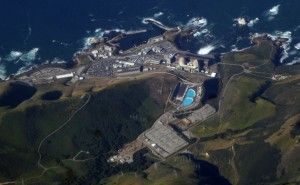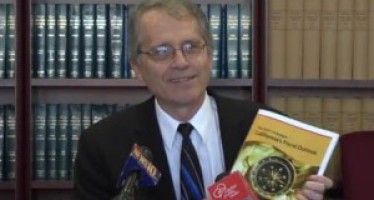Diablo Canyon’s fate: Greens suspect PG&E con game
 One down, one to go. That’s the mind-set of nuclear power opponents who rejoiced over the 2012 closure of the malfunctioning San Onofre nuclear plant in northern San Diego County and are now setting their sights on Pacific Gas & Electric’s Diablo Canyon nuclear plant near Avila Beach in San Luis Obispo County.
One down, one to go. That’s the mind-set of nuclear power opponents who rejoiced over the 2012 closure of the malfunctioning San Onofre nuclear plant in northern San Diego County and are now setting their sights on Pacific Gas & Electric’s Diablo Canyon nuclear plant near Avila Beach in San Luis Obispo County.
But there’s a twist to this story. Recent coverage suggests that PG&E might not put up a fight when its 40-year federal licenses for Diablo Canyon’s two Westinghouse-made nuclear reactors expire in 2024 and 2025. While PG&E’s website depicts a 20-year extension of the licenses as a no-brainer way to keep supplying clean, non-greenhouse-gas power to more than 3 million people, the company’s dithering on the regulatory front has caught environmentalists’ attention.
This is from a recent Los Angeles Times account:
Although PG&E has asserted that the plant’s continued operation would save its customers as much as $16 billion during the additional 20 years, the cost of bringing Diablo Canyon into compliance with environmental and seismic mandates may in fact not be worth the effort.
Energy regulators and advocates have few clues to whether PG&E’s goal is to seek Diablo Canyon’s renewal or find an easy excuse for shutting it down early. “They’re so cagey about the future that I can’t help thinking there’s a strategy here,” says Matthew Freedman, a staff attorney for the consumer watchdog group Turn.
Freedman believes the utility’s intention is to delay the renewal proceeding long enough to hamper any opposition. In 2007, the state Public Utilities Commission directed the utility to decide whether to seek renewal at least 10 years in advance of the license expirations, so energy planners would have time to figure out how to replace Diablo Canyon’s output if the plant went dark. Waiting much longer would be “reckless and gambling with the public interest,” the PUC said.
Utility: ‘We’ve got a lot on our plates’
 A San Francisco Chronicle report, however, is less conspiratorial in its analysis, depicting PG&E leaders as more interested in other issues — starting with damage control with the utility’s reputation over its pending federal criminal trial:
A San Francisco Chronicle report, however, is less conspiratorial in its analysis, depicting PG&E leaders as more interested in other issues — starting with damage control with the utility’s reputation over its pending federal criminal trial:
Once eager to extend Diablo’s licenses, company executives now say they aren’t sure. Since the deadly 2010 explosion of a PG&E natural gas pipeline beneath San Bruno, their focus has been on reforming the company and repairing its image, not relicensing Diablo.
And any extension will involve a fight. The plant sits within a maze of earthquake faults, all of them discovered after construction began in 1968. Seismic safety fears have dogged the nuclear industry in California for more than 50 years, forcing PG&E to abandon plans for one of its first reactors.
“We’ve got a lot on our plates, and we just don’t need to take on another big public issue right now,” said Tony Earley, PG&E Corp.’s CEO.
If Diablo closes, no nuclear plant will take its place. California law forbids building more until federal officials come up with a permanent way to deal with the waste. Thirty-nine years after the law passed, that still hasn’t happened.
This aggravates nuclear power advocates, who thought the deep concerns many have about global warming would lead to a renaissance for nuclear power in California and elsewhere. Instead, Japan’s 2011 disaster at its Fukushima nuclear plant has blunted momentum.
Anti-nuclear activists have spent years comparing conditions at Diablo Canyon with those in Fukushima, suggesting its location on or near several seismic fault lines could lead to a Fukushima-style tragedy along the Central California coast. But the claims of close parallels have generally been discounted by conventional California media.
Chris Reed
Chris Reed is a regular contributor to Cal Watchdog. Reed is an editorial writer for U-T San Diego. Before joining the U-T in July 2005, he was the opinion-page columns editor and wrote the featured weekly Unspin column for The Orange County Register. Reed was on the national board of the Association of Opinion Page Editors from 2003-2005. From 2000 to 2005, Reed made more than 100 appearances as a featured news analyst on Los Angeles-area National Public Radio affiliate KPCC-FM. From 1990 to 1998, Reed was an editor, metro columnist and film critic at the Inland Valley Daily Bulletin in Ontario. Reed has a political science degree from the University of Hawaii (Hilo campus), where he edited the student newspaper, the Vulcan News, his senior year. He is on Twitter: @chrisreed99.
Related Articles
L.A. Times’ Annoying Gatekeeping
John Seiler: I subscribe to the Los Angeles Times’ Sunday edition. So I get access to their online edition without
CA GOP’s Arnold Problem
Going on 11 years now, the California Republican Party has an “Arnold Problem.” Gone from office now almost four years,
CalSTRS hearing underscores Mac Taylor’s destructive happy talk
An Assembly committee hearing Wednesday on the immense underfunding problems facing the California State Teachers’ Retirement System also illuminated another




